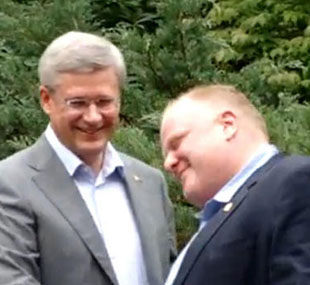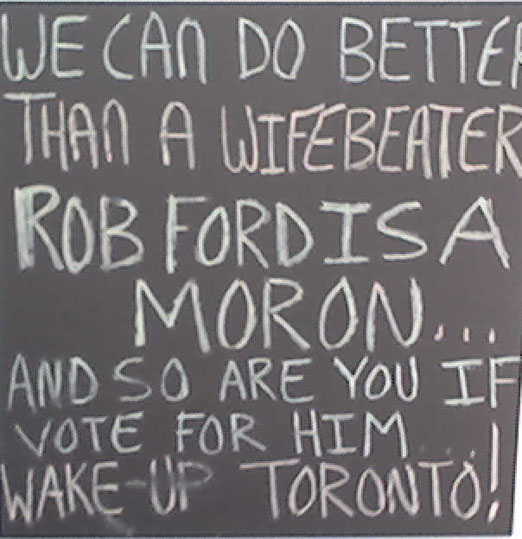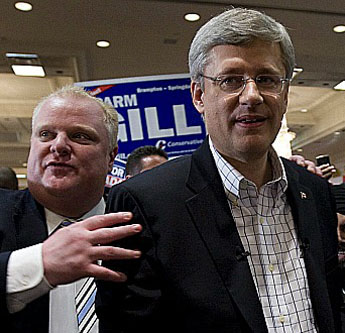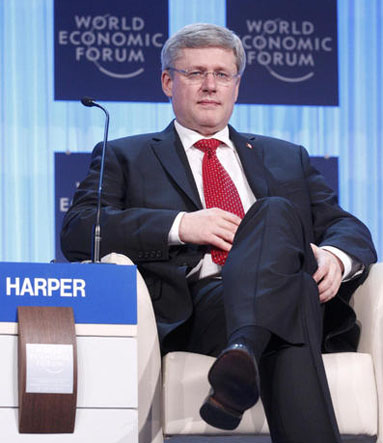If Rob Ford really is a “spent force” in Toronto, does that mean at least something for Stephen Harper too?
Feb 2nd, 2012 | By Counterweights Editors | Category: In Brief As we note in our latest update of our “Streetcar Named Rob Ford” feature, the Toronto Star resident urbanologist Christopher Hume recently declared that : “Just a year into his term, three left to go, Toronto Mayor Rob Ford is a spent force.”
As we note in our latest update of our “Streetcar Named Rob Ford” feature, the Toronto Star resident urbanologist Christopher Hume recently declared that : “Just a year into his term, three left to go, Toronto Mayor Rob Ford is a spent force.”
We think ourselves that this is something of an exaggeration – though an understandable one and certainly no slight on the urbanology talents of Mr. Hume. Yet there can be little doubt, to borrow a more circumspect headline from the Globe and Mail last week, that “Ground shifts at Toronto’s city council as the Ford agenda stalls.”
Inevitably, in some minds at any rate, all this will raise another question. Does the stalling, if not quite the spent force, of the Rob Ford mayoral agenda in Toronto have any implications at all for the larger political scene in Canada, coast to coast to coast?
 The obvious immediate answer here is NO, none at all! Whatever else, the Harper counter-revolution in Canadian federal politics has made it very clear, even to Torontonians, that Toronto is no longer (if it ever was, of course) at the centre of anyone’s Canadian universe.
The obvious immediate answer here is NO, none at all! Whatever else, the Harper counter-revolution in Canadian federal politics has made it very clear, even to Torontonians, that Toronto is no longer (if it ever was, of course) at the centre of anyone’s Canadian universe.
And then again, it is also very clear that, unlike Mayor Ford in Toronto, who, for the most part, is only one vote among 44 others on a formally non-party city council that may be starting to change its collective mind, PM Harper’s Conservatives have a solid and well organized parliamentary majority. Opinion in the country about the PM himself may change. But, barring the very unlikely prospect that his backbenchers will for some reason rise in revolt against him, he can continue to do whatever he wants, until the next federal election in the fall of 2015!
And yet, and yet … To no small extent, PM Harper has his majority because he won an unprecedented 73 of 106 seats in Canada’s most populous province of Ontario. Still more to the point, last May 2 the Harper Conservatives took 32 of 47 seats in the Greater Toronto Area – including nine of 23 seats in the city of Toronto itself.
 It probably does make some sense to say that Rob Ford helped pave the way for all this, with his big victory in the October 25, 2010 Toronto municipal election. If his regime is now becoming seriously unstuck (and the “if” here still does seem an important enough qualifier, for the moment at any rate), that probably will put some kind of stain on the regional credibility of the federal Conservatives.
It probably does make some sense to say that Rob Ford helped pave the way for all this, with his big victory in the October 25, 2010 Toronto municipal election. If his regime is now becoming seriously unstuck (and the “if” here still does seem an important enough qualifier, for the moment at any rate), that probably will put some kind of stain on the regional credibility of the federal Conservatives.
They will still be able to do whatever they like in Ottawa. But the idea that Canada at large has somehow decisively shifted to the right (when the Harper Conservatives still won less than 40% of the cross-country vote last May – and are showing somewhat less support in more recent opinion polls) is bound to seem less convincing. Not in all parts of the country, of course, of course, but certainly in Toronto itself and to some degree in the surrounding region as well!
Last Thursday, to take the perhaps most extreme case in point, the Toronto Star ran an article headlined “Stephen Harper vows big changes to retirement benefits and immigration policy.” To us it was most notable for its accompanying photo of PM Harper, just before (or after?) he spoke at the World Economic Forum in Davos, Switzerland. He looked full to the brim with hubris – like a man who was really starting to believe his own hyperbolic press clippings!
 In Toronto at any rate, reading about the coterminous struggles of Mayor Ford does make you wonder whether Mr. Harper’s Davos appearance will eventually prove to have marked the zenith of his Canadian political career. (His talk at Davos was not widely noted in the global village beyond Canada, btw – and why, various voices wondered on TVOntario last night, did he take it upon himself to criticize current European policy so gratuitously, as if he in his small corner were so much smarter? Australia, which has a similar resource-based economy to Canada, has also been doing quite well lately.) Without doubt Mr. Harper’s domestic opponents are still struggling to re-group and reorganize. But like him they have even more than three more years too.
In Toronto at any rate, reading about the coterminous struggles of Mayor Ford does make you wonder whether Mr. Harper’s Davos appearance will eventually prove to have marked the zenith of his Canadian political career. (His talk at Davos was not widely noted in the global village beyond Canada, btw – and why, various voices wondered on TVOntario last night, did he take it upon himself to criticize current European policy so gratuitously, as if he in his small corner were so much smarter? Australia, which has a similar resource-based economy to Canada, has also been doing quite well lately.) Without doubt Mr. Harper’s domestic opponents are still struggling to re-group and reorganize. But like him they have even more than three more years too.

